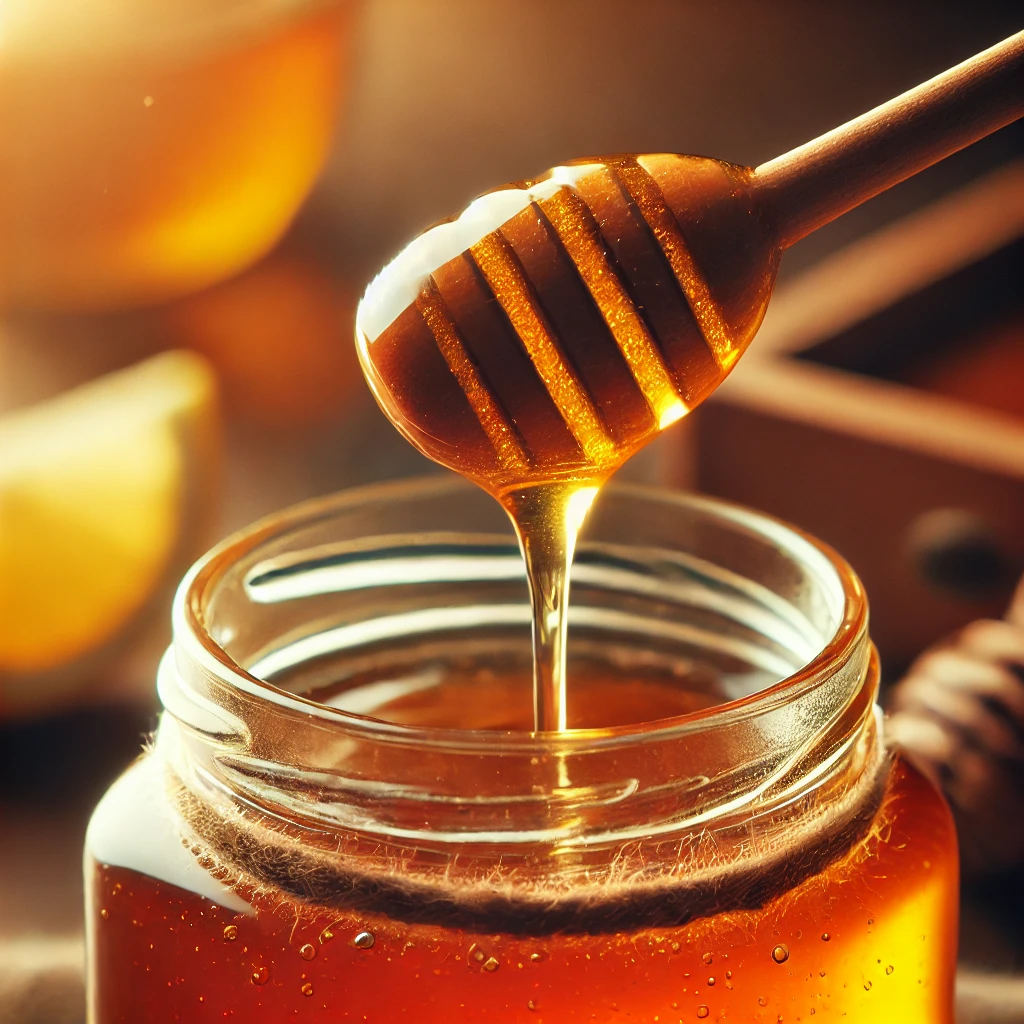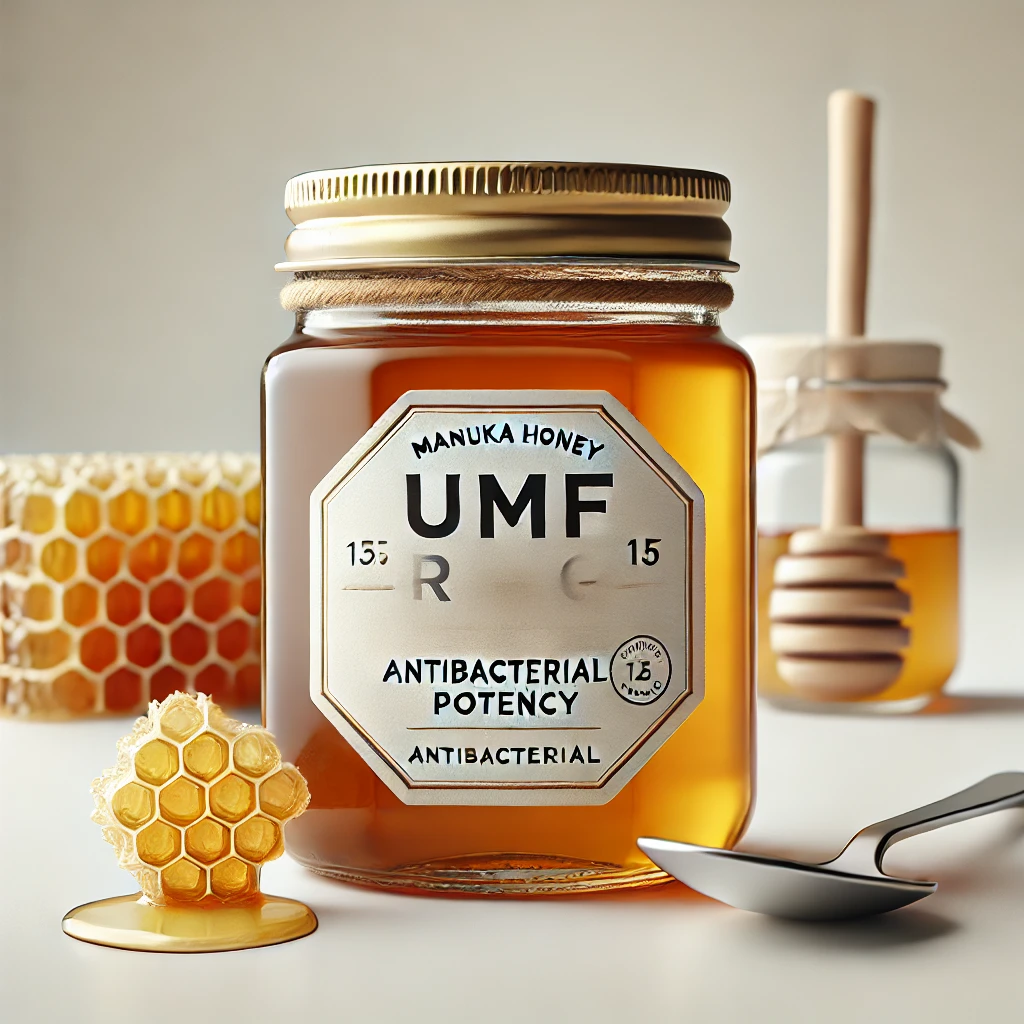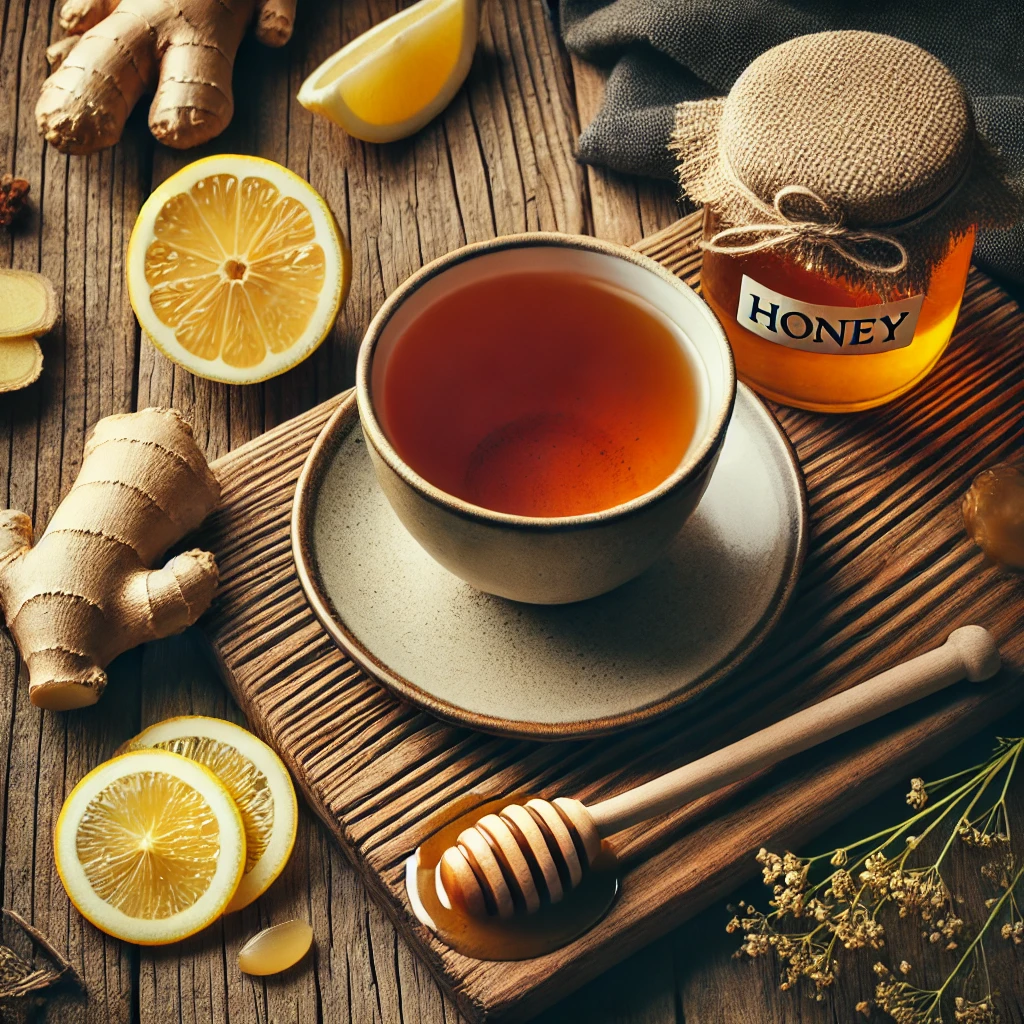The Benefits of Honey for Sore Throat Relief

1. Introduction: The Benefits of Honey for Sore Throat Relief
Ever wonder about the benefits of honey for sore throat relief and why it’s a timeless remedy? Honey isn’t just a sweet treat—it’s a natural powerhouse for soothing throat discomfort, reducing coughs, and fighting off infections. It works in a few important ways to soothe your throat:
- Coats the throat to ease irritation
- Provides natural antibacterial benefits, fighting the germs that can worsen throat pain
- Acts as a natural cough suppressant, helping you rest and recover faster
Whether you’re battling a cold, dealing with a persistent cough, or just want a natural solution to soothe your throat, honey could be the answer. In fact, many studies support honey’s ability to reduce inflammation and alleviate throat discomfort.
Honey is one of the most effective remedies for soothing sore throats, as its antibacterial properties can significantly reduce inflammation.”
— Dr. Joseph Mercola, a physician and author known for promoting natural remedies.
Why Choose Manuka Honey?
While regular honey can be helpful, Manuka honey is often considered a superior option due to its higher antibacterial content. Manuka honey is known for its unique antibacterial properties, thanks to a compound called methylglyoxal (MGO). This makes it especially potent for sore throats and other health concerns.
By choosing Manuka honey, you’re not just getting a natural sweetener, you’re accessing a powerful remedy that has been scientifically proven to provide more relief than traditional honey.
2. Why Honey Works for Sore Throats: The Science Behind It
Honey has long been hailed as a natural remedy for sore throats, and there’s a reason it’s been passed down through generations. But what makes honey so effective in soothing throat discomfort? Let’s explore the science behind its healing properties.
What Makes Honey Effective for Sore Throats?
Honey works in multiple ways to ease throat pain:
- Anti-inflammatory properties: Honey naturally reduces inflammation, which can help soothe the irritation in your throat.
- Antibacterial effects: Honey, especially Manuka honey, contains antibacterial agents that can help fight off infections causing sore throats.
- Natural coating: One of honey’s most immediate benefits is its ability to coat the throat, providing a soothing barrier that eases discomfort.
- Cough suppressant: Honey can help reduce coughing, which is often associated with sore throats and colds. According to studies, honey may be just as effective as over-the-counter cough syrups.
Raw Honey vs. Processed Honey: Which is Better?
When it comes to choosing between raw and processed honey, raw honey generally offers more benefits. Raw honey contains more enzymes, nutrients, and antioxidants, which contribute to its healing properties. Processed honey, on the other hand, may lose some of these benefits due to heating.
For those seeking a more potent remedy, Manuka honey stands out. With its higher concentration of methylglyoxal (MGO), it’s a more powerful antibacterial agent, making it especially effective for sore throats.
How Long Does It Take for Honey to Relieve a Sore Throat?
The relief from honey can be almost immediate, especially due to its soothing coating effect. However, if you’re using honey to combat an infection, consistent use over several days may provide the best results.
Can Honey Help with Allergies?
Interestingly, some believe that consuming local honey may help alleviate symptoms of allergies. The theory is that local honey contains pollen from your environment, and consuming it can help your body build up a tolerance. While this is not a proven method, some people find relief from sore throats caused by seasonal allergies through regular honey consumption.
Can Honey Help with Strep Throat?
While honey can be soothing for sore throats, it’s important to note that strep throat—a bacterial infection—often requires antibiotics for full recovery. Honey, especially Manuka honey, may help ease the discomfort associated with strep throat, but it’s not a replacement for medical treatment. If you suspect you have strep throat, it’s best to consult a healthcare provider for proper diagnosis and care.
3. Why Manuka Honey Is the Best Choice for Sore Throat Relief
While all honey offers health benefits, Manuka honey stands out as a particularly potent remedy for sore throats. Let’s explore what makes Manuka honey so unique and why it may be your best option for relief.

What Is Manuka Honey and Why Is It Special?
Manuka honey is a special type of honey that originates from New Zealand and Australia. It’s produced by bees that pollinate the flowers of the Manuka bush. What sets it apart from regular honey is its exceptionally high concentration of methylglyoxal (MGO), a compound that gives Manuka honey its powerful antibacterial properties. The higher the MGO level, the more potent the honey is at fighting bacteria and soothing inflammation.
“Manuka honey’s high concentration of methylglyoxal makes it uniquely effective at fighting infections and promoting healing.”
— Dr. Peter Molan, biochemist and pioneer in Manuka honey research.
Understanding the Unique Manuka Factor (UMF) Rating
When shopping for Manuka honey, you’ll often see a UMF (Unique Manuka Factor) rating. This rating system measures the concentration of beneficial compounds, including MGO. A higher UMF rating indicates a stronger antibacterial effect, which makes the honey more effective in treating sore throats, wounds, and other ailments.
- UMF 10+: Provides moderate antibacterial activity and can be useful for general health and mild throat issues.
- UMF 15+ or higher: Offers a much stronger antibacterial effect and is recommended for more severe conditions like persistent sore throats or infections.
How Manuka Honey Compares to Other Natural Remedies
While traditional honey and other natural remedies (like herbal teas or saltwater gargles) offer relief, Manuka honey has the added benefit of stronger antibacterial and anti-inflammatory properties due to its high MGO content. This makes it a superior choice for those seeking a natural solution to combat both sore throat symptoms and underlying infections.
Why Manuka Honey Is Your Best Choice for Sore Throats
If you’re dealing with a sore throat that just won’t go away, Manuka honey is likely your best option. Not only does it provide the same soothing and cough-suppressing benefits as regular honey, but its powerful antibacterial properties help tackle the root cause of many sore throats—bacteria and infection.
4. How to Use Manuka Honey for Maximum Sore Throat Relief
Now that you know why Manuka honey is so effective, let’s explore the best ways to use it for sore throat relief. Whether you prefer it raw or mixed with other remedies, there are various methods to make the most of this natural powerhouse.

How to Take Manuka Honey for a Sore Throat
One of the simplest and most effective ways to use Manuka honey is by taking it directly:
- Raw: Take a spoonful of Manuka honey and let it dissolve slowly in your mouth. This coats your throat, providing immediate relief.
- In Tea: Add a teaspoon of Manuka honey to warm (not boiling) water or tea. The warm liquid helps soothe the throat while the honey works its antibacterial magic.
- With Lemon and Ginger: Combine Manuka honey with lemon and ginger in warm water. This trio offers a powerful combination of soothing, anti-inflammatory, and immune-boosting properties.
A Personal Experience with Manuka Honey
“Whenever my family or I feel a sore throat coming on, I reach for a spoonful of high UMF Manuka honey. It soothes the irritation almost instantly, and I believe it has helped us recover faster from colds and sore throats over time.”
— Dr. James DiNicolantonio, pharmacologist and Manuka honey advocate
Can You Mix Honey with Other Ingredients for Sore Throat Relief?
Absolutely! Mixing Manuka honey with ingredients like lemon or ginger enhances its effectiveness:
- Lemon: Lemon is high in vitamin C and works as a natural astringent, helping to reduce inflammation.
- Ginger: Ginger contains anti-inflammatory compounds that complement honey’s soothing properties.
These combinations make for powerful home remedies that can provide fast relief from sore throat pain and congestion.
How Much Manuka Honey Should You Take?
While there’s no strict dosage, most experts recommend 1 to 2 teaspoons of Manuka honey two or three times a day for best results. If you’re using it in tea or other mixtures, you can adjust the amount based on taste preferences.
Is Honey More Effective for Flu-Related Sore Throats?
Honey not only soothes your throat but may also provide a gentle boost to your immune system. Studies suggest that honey’s natural antioxidants and antibacterial properties can help strengthen immune defenses, making it a valuable addition to your routine when fighting off colds or flu. Consuming honey regularly, especially during cold and flu season, may help support your body’s natural ability to fend off infections.
“Honey has been shown to reduce coughing and throat discomfort in children with upper respiratory infections more effectively than many over-the-counter medications.”
— Dr. Ian M. Paul, Professor of Pediatrics, Penn State University.
For sore throats caused by the flu, Manuka honey works as a natural remedy by:
- Reducing throat irritation caused by coughing.
- Suppressing a dry or persistent cough.
- Easing throat pain associated with flu symptoms.
Whether you’re experiencing a cold or flu, honey acts as a natural cough suppressant and throat soother. In many cases, it can provide quicker relief than over-the-counter medications.
Can Honey Help with Congestion and Dry Coughs?
Yes! Honey, especially Manuka honey, not only soothes the throat but also helps with upper respiratory issues like congestion and dry coughs. Its ability to coat the throat makes it easier to breathe and reduces coughing fits, especially at night.
5. Choosing the Best Manuka Honey Product for Sore Throat Relief
Not all Manuka honey is created equal, and choosing the right product is essential to get the maximum benefits for your sore throat. Here’s how to make sure you’re getting the best quality honey to ease your symptoms.
How to Choose the Right Manuka Honey
When selecting Manuka honey, you’ll want to focus on the UMF (Unique Manuka Factor) rating. This rating system measures the potency of the honey based on the concentration of its antibacterial compounds, including methylglyoxal (MGO). Here’s a quick guide:
- UMF 10+: Offers moderate antibacterial activity and is great for general health and mild throat irritation.
- UMF 15+: Provides stronger antibacterial effects, making it more suitable for persistent sore throats or colds.
- UMF 20+: This grade has the highest antibacterial power, ideal for those dealing with more severe throat infections.
When buying Manuka honey, look for a label that clearly states the UMF rating, as this ensures you’re getting the real deal.
Where Can You Buy High-Quality Manuka Honey?
You can find Manuka honey at most health food stores or through online retailers. However, it’s crucial to purchase from reputable sources to avoid counterfeit or low-quality products. Here are a few tips for buying:
- Choose trusted brands that are certified by the UMF Honey Association.
- Ensure the UMF logo is present on the label.
- Check the country of origin—authentic Manuka honey is typically from New Zealand or Australia.
6. Side Effects and Safety Concerns of Using Manuka Honey for Sore Throats
While Manuka honey is a natural and effective remedy for sore throats, it’s essential to be aware of any potential side effects or safety concerns. Here’s what you need to know before incorporating it into your wellness routine.
Are There Any Side Effects of Using Manuka Honey?
For most people, consuming Manuka honey is safe and well-tolerated. However, a few individuals may experience side effects, such as:
- Allergic Reactions: Some people, particularly those allergic to bees or pollen, may develop allergic reactions after consuming honey. Symptoms can include swelling, hives, or difficulty breathing.
- Digestive Issues: In rare cases, consuming too much honey may lead to gastrointestinal discomfort, such as bloating or diarrhea.
- High Sugar Content: While honey is a natural sweetener, it is still high in sugar, so people with certain conditions (like diabetes) should consume it in moderation.
Can People with Diabetes Use Honey for Sore Throats?
People with diabetes can use honey, but it should be done with caution. Honey has a relatively high glycemic index, meaning it can raise blood sugar levels. For sore throat relief, diabetics should consult their healthcare provider and opt for small quantities to avoid blood sugar spikes.
Is Honey Safe for Infants?
No, honey—including Manuka honey—should not be given to infants under one year old. Honey can contain spores of Clostridium botulinum, which may cause infant botulism, a rare but serious condition. For children over one year, however, honey is generally considered safe.
Should You Consult a Doctor Before Using Manuka Honey?
While Manuka honey is safe for most people, it’s always a good idea to consult with your doctor if:
- You have diabetes and are concerned about the sugar content.
- You have severe allergies, especially to pollen or bees.
- You’re pregnant or breastfeeding, to ensure it aligns with your health plan.
Is Honey Safe During Pregnancy?
Yes, honey is generally safe for pregnant women. However, if you have gestational diabetes or other health concerns, it’s wise to consult with your doctor before consuming honey regularly.
7. Conclusion: Why Manuka Honey Should Be Your Go-To Remedy
After exploring the numerous benefits of Manuka honey, it’s clear that this natural remedy is more than just a sweet treat. Whether you’re battling a sore throat, a persistent cough, or flu-related symptoms, Manuka honey offers powerful antibacterial, anti-inflammatory, and soothing properties that can make a real difference.
By choosing Manuka honey over regular honey, you’re not only soothing your throat but also addressing the root cause of many throat infections, thanks to its high concentration of methylglyoxal (MGO). From its immediate soothing effects to its ability to support immune function and fight off bacteria, Manuka honey is a reliable, all-natural option for anyone seeking relief from sore throats.
If you haven’t yet tried Manuka honey, now’s the time. Start by incorporating it into your daily routine—whether raw, in tea, or mixed with other natural remedies like lemon and ginger—and experience the difference for yourself.
Want to explore more ways to benefit from honey’s natural properties? Check out our related article on the Health Benefits of Honey or watch our latest video on how to use honey for natural wellness.
